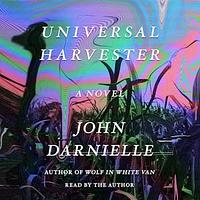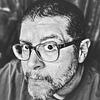You need to sign in or sign up before continuing.
Take a photo of a barcode or cover
3.5 stars
I enjoyed the concept of the story, but I have learned that I am really not a huge fan of Darnielle's meandering writing style. If I am going to read another of his books, I will make sure it is an audio book. His sentences go on forever and and bounce around a little bit before settling on one idea. He also has a very romantic, flowery way of writing that feels overly wordy, which seems like an oxymoron since his novels are never really that long.
I enjoyed the concept of the story, but I have learned that I am really not a huge fan of Darnielle's meandering writing style. If I am going to read another of his books, I will make sure it is an audio book. His sentences go on forever and and bounce around a little bit before settling on one idea. He also has a very romantic, flowery way of writing that feels overly wordy, which seems like an oxymoron since his novels are never really that long.
The writing is gripping and immersive but the horror stops halfway through the book and the plot gets lost in too many directional changes.
This is a great follow up to Darnielle's first novel. The writing in "Wolf..." felt a little cold/distant. By the end of that novel, I felt it fit with the story. But, I still felt a little removed from the whole event. This time around, the distance is still present. This time, I think the distance is very much a part of the whole story. What starts really creepy still feels pretty creepy by the end. Not scary creepy, but disturbed and sad. A quick read because I had to know what was happening.
I feel like I need to psychoanalyze this one a little bit, because superficially it’s kind of a flop. The thing is that it’s so beautifully written that’s it confusing to reader how little happens, it’s smart enough that when it reaches the underwhelming conclusion, the reader asks, “is this on purpose?”. The thing is that it’s a cosmic horror novel through-and-through but establishes itself in the first act as something more like a thriller. It begins with found-footage elements about creepy video clips inserted into video store rentals. This compelling introduction is strangely dropped as the book proceeds to its real goal; it’s a bait-and-switch from the concrete to the abstract. It’s a book about a cult we never see and a cult leader we only meet briefly, secondhand as a homeless man passing out bible tracts. And yet the cult’s influence is felt in resonating waves. The video store owner seeks the origins in the clips and find the younger woman Lisa. In ways we are not privy to, she is drawn in to something and is functionally lost. The protagonist, a young man with a missing mother and an uncertain future, admires and likes this older woman and wants to rescue her from her impending fate but finds he cannot and chooses not to sacrifice his future. There is even a bit about him already making a sacrifice in choosing to stay in a blue collar town because he is unwilling to leave the ghost of his mother behind. And then the book pivots to a brother and sister, the brother discovers this over-a-decade old mystery and wants to pursue it but is unwittingly putting his sister in danger by bringing her nearer the insidious cosmic influence of the unseen cult. An email they receive warns them they can’t do anything. And the climax of the book is really then choosing to drive by Lisa’s house and visit the town instead, a decision to appreciate what they can while alive rather than seek out darkness. This is told secondhand, like most things. This is a book about things just outside your field of vision which could take over your life, destroy you and the people you care about, and how it’s better just not to look at them. This is a book about men wanting to rescue women from self destruction and being unable to and the psychic toll it takes. There was nothing outwardly wrong with the life of Lisa’s mother Irene, her husband made all the sacrifices for her that he could, but there was a nagging feeling, a drive that took her to the unseen world. This action has a generational impact and sent out ripples, and the situation repeated itself. The crux of the book is really the decision to look away, to protect your loved one by not letting them see. It’s a strange book, the story is withheld from the reader, but I do think it shows tremendous promise. If anything, it takes a bleak view of male white-knightery and urges the reader to accept that once someone is on the road, it’s better just to turn away because chasing a ghost will only bring sorrow.
I enjoyed this but I think it’s definitely a weird book and most people won’t like it because every time you think you have a feel for where it’s going it goes a different way. It skips around with characters and time. Also it’s quite slow and sometimes you’re not really sure what’s going on. If any of those things annoy you, skip this book. If you aren’t bothered by them, then lucky you! You have a very unique experience ahead of you!
I wanted so desperately to like this book. A lot. Unfortunately, I think it was marketed as something that it wasn't.
This is not a thriller. It is not a mystery. It is more of an elegy to grief and nostalgia, and perhaps even a bit of a tribute to the ambiguous things in life. There are little answers.
The structure of the story is stapled together awkwardly, and switches stories around that don't really go anywhere.
It felt like a peak into everyday life, where nothing super exciting happens at all.
Nonetheless, the writing is very poignant, and there are some unsettling scenes. Not unsettling in the sense of terrifying, or scary, or even page-turning. But just genuine scenes where something feels off.
I wouldn't recommend this book. I am happy to have read it, but I was expecting a lot more intensity than I got.
This is not a thriller. It is not a mystery. It is more of an elegy to grief and nostalgia, and perhaps even a bit of a tribute to the ambiguous things in life. There are little answers.
The structure of the story is stapled together awkwardly, and switches stories around that don't really go anywhere.
It felt like a peak into everyday life, where nothing super exciting happens at all.
Nonetheless, the writing is very poignant, and there are some unsettling scenes. Not unsettling in the sense of terrifying, or scary, or even page-turning. But just genuine scenes where something feels off.
I wouldn't recommend this book. I am happy to have read it, but I was expecting a lot more intensity than I got.
I must have approached this with the wrong expectations. While I thought the novel was well-written and had some interesting concepts, I do not feel like I was given the tale I came here for. More thoughts to come.
I feel like the publisher did not know how to position this book so went with a rural version of The Ring with a dash of True Detective. It opens building an effective sense of dread, but while following the puzzle box formula, it becomes something a bit more subtle. As the reader starts to get a sense of the narrator, their perspective begins to shift. We start to realize that maybe we aren't getting the whole story. Perhaps, like life itself, the real story depends on where you come into it and what came before. While not without its flaws, the plot holds together pretty well and when it ends up where it does, most everything comes together in a fairly satisfying way.
dark
mysterious
medium-paced
Plot or Character Driven:
Plot
Strong character development:
Complicated
Loveable characters:
N/A
Diverse cast of characters:
N/A
Flaws of characters a main focus:
N/A
This book was three things: an ode to small towns, a love song to Iowa, and a prose poem meditation on the idea of creating one's own story within heavy confines. Nothing about this was what I expected it to be, and that was okay. I finished it a few days ago and couldn't decide what I thought about it, so I've been chewing on it, trying to decide.
The writing is lovely. I enjoyed Darnielle's style. It pulled me in and compelled me to keep going, even through to moments where I couldn't figure out what was happening or why. I liked his little quirk of occasionally proposing ways the story might have gone differently. I liked his characters' voices (though the first/third person weirdness at the end was a little rocky).
I really enjoyed the tour around Iowa, and all the references to other nearby place that I know and love. Dustin thought he was weirdly fixated on the Black Hills, for someone writing about Iowa, but I think that was part of the point Darnielle was trying to make - when you have a small town living inside you, you can escape, but you escape to other small places. People who live and breath small towns don't go bigger - people who are bigger come to small towns to find peace and purpose.
I'm left unsure what to think of the Lisa plot - exactly what it meant, or exactly how it ended. I'm not sure that fogginess serves any particular purpose, so I don't love it, but it didn't feel inappropriate, lined up against the other sort of hazy characteristics of the story and its telling.
I also can't decide quite what to make of the book's title. If you decide to read it, I'd be interested in your opinion.
The writing is lovely. I enjoyed Darnielle's style. It pulled me in and compelled me to keep going, even through to moments where I couldn't figure out what was happening or why. I liked his little quirk of occasionally proposing ways the story might have gone differently. I liked his characters' voices (though the first/third person weirdness at the end was a little rocky).
I really enjoyed the tour around Iowa, and all the references to other nearby place that I know and love. Dustin thought he was weirdly fixated on the Black Hills, for someone writing about Iowa, but I think that was part of the point Darnielle was trying to make - when you have a small town living inside you, you can escape, but you escape to other small places. People who live and breath small towns don't go bigger - people who are bigger come to small towns to find peace and purpose.
I'm left unsure what to think of the Lisa plot - exactly what it meant, or exactly how it ended. I'm not sure that fogginess serves any particular purpose, so I don't love it, but it didn't feel inappropriate, lined up against the other sort of hazy characteristics of the story and its telling.
I also can't decide quite what to make of the book's title. If you decide to read it, I'd be interested in your opinion.





